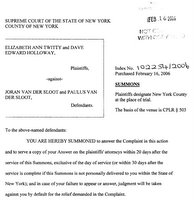Could lawyers pave the way to peace?
When I was a student, I loved comparative law.
I was lucky enough to study it in England, Scotland, Germany, and The Netherlands.
Although I don’t work in that legal field, I try to keep up.
Every four years, there is a congress, organized by the International Academy of Comparative Law.
The 17th Congress took place in the third week of July.
It featured a variety of topics: international cooperation and the status of international law (the participants in the congress visited the International Court in The Hague), the rights of "job immigrants," the rights of minorities and of same-sex couples, methods of analysis in law, government corruption and judicial responsibility and much, much more.
But far more important were the conversations between the Israelis at the congress and the six Iranian professors from the universities of Tehran and Qom.
The Iranians attended the discussions focusing on the international fight against terrorism and did’t evade questions about tough subjects, such as freedom of expression and criticism of the government.
"It is possible to publish academic articles and criticize the regime, but not on key political subjects," they said unanimously.
They were curious about Israel and wondered if they would be able to participate in international conferences in Israel.
They also pointed out that they supported president Mahmoud Ahmadinejad for his promises to improve the economic situation, and not for his foreign policy, in which they don’t take an interest.
During the congress, a special plenary session on the fight against terrorism was devoted to a lecture by Lord Johan Steyn, a former law lord in the United Kingdom.
He spoke about comparative law, about the importance of law in different countries in providing a broader and more fitting interpretation of local law.
He sharply criticized the United States for holding detainees in Guantanamo without trial - doing so, he said, was a deviation from accepted democratic principles.
Fighting terrorism without harming individual rights is a tough call.
I agree with Steyn that actions against terrorism must also be subordinate to real judicial review, and that the courts have a central role in preserving the fundamentals of democracy.
As Israel's Supreme Court president, Justice Aharon Barak, puts it:
“democracy should fight with one hand tied behind its back, in order to ensure the preservation of the principles of the rule of law that are the foundation of democracy”.
But what about countries without democracy?
As the attendance of our fellow legal eagles from theocratic countries, prove:
lawyers could pave the way to international peaceful coexistence.








